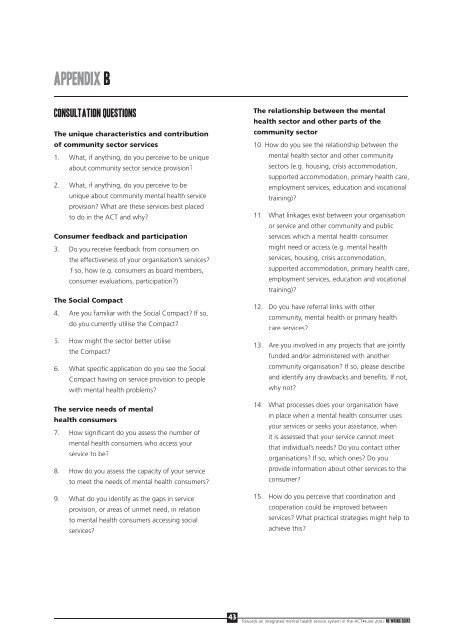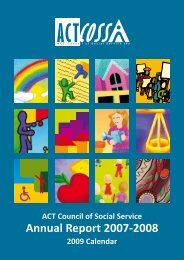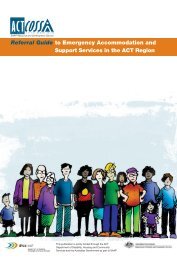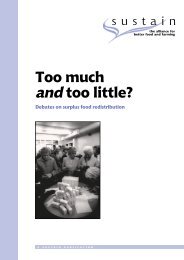actcoss text final.indd - ACT Council of Social Service
actcoss text final.indd - ACT Council of Social Service
actcoss text final.indd - ACT Council of Social Service
You also want an ePaper? Increase the reach of your titles
YUMPU automatically turns print PDFs into web optimized ePapers that Google loves.
appendix B<br />
CONSULTATION QUESTIONS<br />
The unique characteristics and contribution<br />
<strong>of</strong> community sector services<br />
1. What, if anything, do you perceive to be unique<br />
about community sector service provision?<br />
2. What, if anything, do you perceive to be<br />
unique about community mental health service<br />
provision? What are these services best placed<br />
to do in the <strong>ACT</strong> and why?<br />
Consumer feedback and participation<br />
3. Do you receive feedback from consumers on<br />
the effectiveness <strong>of</strong> your organisation’s services?<br />
If so, how (e.g. consumers as board members,<br />
consumer evaluations, participation?)<br />
The <strong>Social</strong> Compact<br />
4. Are you familiar with the <strong>Social</strong> Compact? If so,<br />
do you currently utilise the Compact?<br />
5. How might the sector better utilise<br />
the Compact?<br />
6. What specific application do you see the <strong>Social</strong><br />
Compact having on service provision to people<br />
with mental health problems?<br />
The service needs <strong>of</strong> mental<br />
health consumers<br />
7. How significant do you assess the number <strong>of</strong><br />
mental health consumers who access your<br />
service to be?<br />
8. How do you assess the capacity <strong>of</strong> your service<br />
to meet the needs <strong>of</strong> mental health consumers?<br />
9. What do you identify as the gaps in service<br />
provision, or areas <strong>of</strong> unmet need, in relation<br />
to mental health consumers accessing social<br />
services?<br />
The relationship between the mental<br />
health sector and other parts <strong>of</strong> the<br />
community sector<br />
10. How do you see the relationship between the<br />
mental health sector and other community<br />
sectors (e.g. housing, crisis accommodation,<br />
supported accommodation, primary health care,<br />
employment services, education and vocational<br />
training)?<br />
11. What linkages exist between your organisation<br />
or service and other community and public<br />
services which a mental health consumer<br />
might need or access (e.g. mental health<br />
services, housing, crisis accommodation,<br />
supported accommodation, primary health care,<br />
employment services, education and vocational<br />
training)?<br />
12. Do you have referral links with other<br />
community, mental health or primary health<br />
care services?<br />
13. Are you involved in any projects that are jointly<br />
funded and/or administered with another<br />
community organisation? If so, please describe<br />
and identify any drawbacks and benefits. If not,<br />
why not?<br />
14. What processes does your organisation have<br />
in place when a mental health consumer uses<br />
your services or seeks your assistance, when<br />
it is assessed that your service cannot meet<br />
that individual’s needs? Do you contact other<br />
organisations? If so, which ones? Do you<br />
provide information about other services to the<br />
consumer?<br />
15. How do you perceive that coordination and<br />
cooperation could be improved between<br />
services? What practical strategies might help to<br />
achieve this?<br />
43 Towards an integrated mental health service system in the <strong>ACT</strong>•June 2007 NO WRONG DOORS













